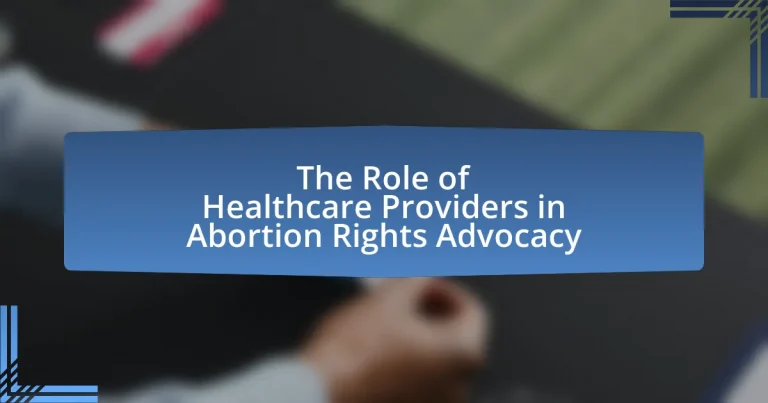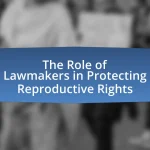Healthcare providers are pivotal in abortion rights advocacy, utilizing their medical expertise to support patient autonomy and influence policy. They educate patients on reproductive health options, participate in advocacy organizations, and engage in lobbying efforts to promote access to safe and legal abortion services. The article explores how healthcare providers impact public perception and policy changes regarding abortion, the challenges they face due to legal restrictions and societal stigma, and the support systems available to enhance their advocacy efforts. Additionally, it discusses effective strategies for communication and collaboration among healthcare providers to strengthen their advocacy initiatives.
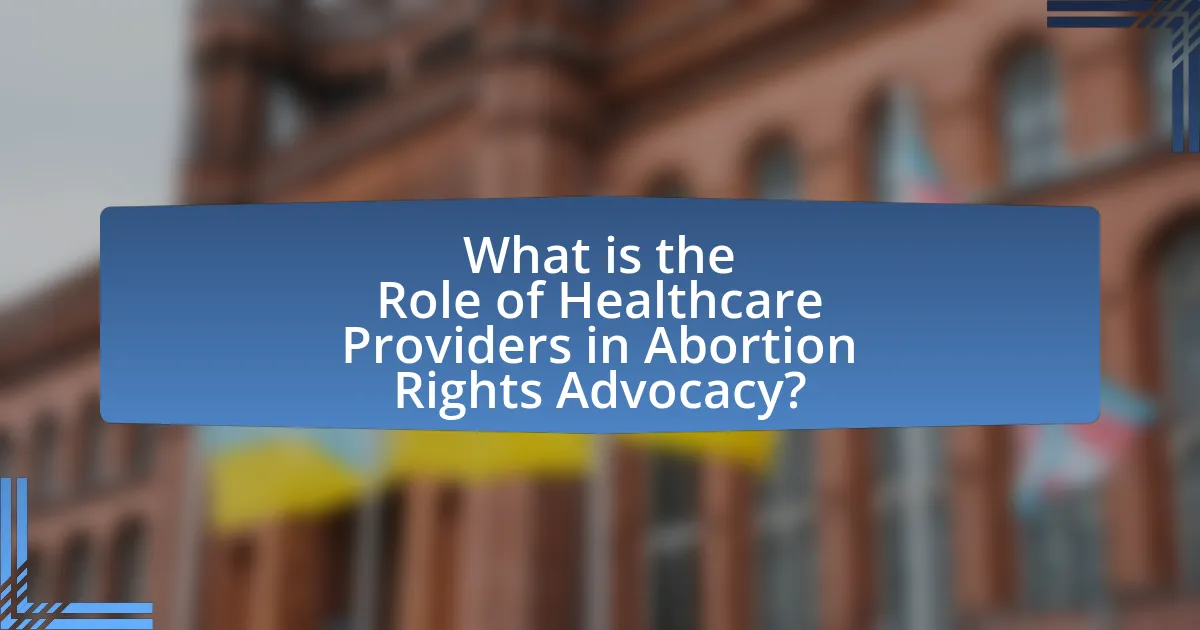
What is the Role of Healthcare Providers in Abortion Rights Advocacy?
Healthcare providers play a crucial role in abortion rights advocacy by offering medical expertise, supporting patient autonomy, and influencing policy through their professional authority. They educate patients about reproductive health options, including abortion, ensuring informed decision-making. Additionally, healthcare providers often participate in advocacy organizations and initiatives that promote access to safe and legal abortion services, thereby shaping public policy and legislative frameworks. Their involvement is supported by data indicating that states with more healthcare providers advocating for abortion rights tend to have better access to these services, highlighting the impact of their advocacy on reproductive health outcomes.
How do healthcare providers influence abortion rights?
Healthcare providers influence abortion rights by advocating for patient access to safe and legal abortion services and shaping public policy through their professional organizations. These providers often participate in lobbying efforts, contribute to legal challenges against restrictive laws, and educate the public about reproductive health. For instance, organizations like the American College of Obstetricians and Gynecologists have publicly supported abortion rights, emphasizing the importance of access to comprehensive reproductive healthcare. Their clinical expertise and firsthand experiences with patients allow them to provide compelling testimonies that highlight the necessity of abortion services, thereby influencing legislative decisions and public opinion.
What specific actions do healthcare providers take in advocacy?
Healthcare providers engage in advocacy by educating patients about their reproductive rights and options, including abortion services. They participate in public awareness campaigns to inform communities about the importance of access to safe and legal abortion. Additionally, healthcare providers may collaborate with organizations that promote reproductive health policies, providing expert testimony in legislative hearings to influence policy decisions. They also offer support to patients navigating the healthcare system, ensuring they receive comprehensive care and resources. These actions are critical in shaping public opinion and policy regarding abortion rights, as evidenced by studies showing that informed healthcare providers can significantly impact patient choices and community health outcomes.
How do healthcare providers educate patients about abortion options?
Healthcare providers educate patients about abortion options through comprehensive counseling, providing evidence-based information, and facilitating access to resources. They discuss the various types of abortion procedures, including medical and surgical options, and explain the associated risks and benefits. Providers often utilize pamphlets, digital resources, and one-on-one consultations to ensure patients understand their choices. Research indicates that informed patients are more likely to make decisions aligned with their values and needs, highlighting the importance of thorough education in the decision-making process.
Why is the involvement of healthcare providers crucial in abortion rights?
The involvement of healthcare providers is crucial in abortion rights because they are essential in delivering safe, legal, and medically sound abortion services. Healthcare providers possess the expertise to ensure that abortions are performed safely, reducing the risk of complications and protecting women’s health. According to the World Health Organization, unsafe abortions lead to approximately 47,000 deaths annually, highlighting the importance of qualified medical professionals in providing safe procedures. Furthermore, healthcare providers advocate for patient rights and access to reproductive healthcare, influencing policy and legislation that supports abortion rights. Their clinical knowledge and ethical responsibility position them as key advocates in the ongoing discourse surrounding reproductive rights.
What impact do healthcare providers have on public perception of abortion?
Healthcare providers significantly influence public perception of abortion by shaping the discourse around its safety, legality, and ethical considerations. Their professional expertise and firsthand experiences allow them to provide accurate information, counter misinformation, and advocate for patient rights. For instance, studies show that when healthcare providers openly discuss abortion as a safe medical procedure, it can lead to increased public support and reduced stigma surrounding the topic. Additionally, healthcare providers who engage in community education and advocacy efforts can help normalize conversations about abortion, thereby positively impacting societal attitudes.
How do healthcare providers contribute to policy changes regarding abortion?
Healthcare providers contribute to policy changes regarding abortion by advocating for evidence-based practices and patient-centered care. They engage in lobbying efforts, provide expert testimony, and participate in public health campaigns to influence legislation. For instance, organizations like the American College of Obstetricians and Gynecologists have actively opposed restrictive abortion laws by presenting data on the safety and necessity of abortion services. Additionally, healthcare providers often collaborate with advocacy groups to educate policymakers about the implications of proposed laws on women’s health, thereby shaping public policy through informed dialogue and research-backed recommendations.
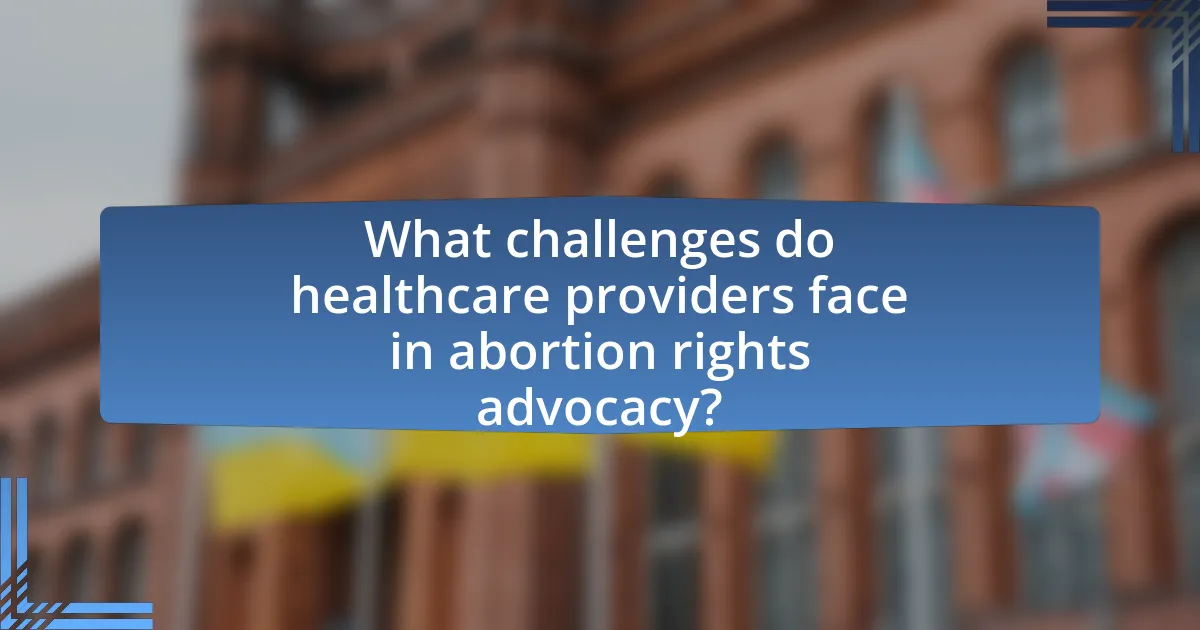
What challenges do healthcare providers face in abortion rights advocacy?
Healthcare providers face significant challenges in abortion rights advocacy, primarily due to legal restrictions and societal stigma. Legal frameworks in various regions impose limitations on abortion services, which can hinder healthcare providers from offering comprehensive care. For instance, in the United States, the overturning of Roe v. Wade has led to numerous state-level bans and restrictions, complicating the ability of providers to advocate for patients’ rights effectively. Additionally, societal stigma surrounding abortion can lead to professional repercussions, including harassment or discrimination against healthcare providers who support abortion rights. This stigma can create a hostile environment that discourages open dialogue and advocacy efforts within the healthcare community.
How do legal restrictions affect healthcare providers’ advocacy efforts?
Legal restrictions significantly limit healthcare providers’ advocacy efforts by imposing constraints on their ability to discuss, promote, or facilitate access to abortion services. These restrictions can include laws that penalize providers for offering information about abortion options or for referring patients to services, thereby creating a chilling effect on open communication. For instance, in states with stringent abortion laws, healthcare providers may face legal repercussions for providing comprehensive reproductive health education, which undermines their role as advocates for patient rights and access to care. Consequently, these legal barriers hinder healthcare providers from effectively supporting patients in making informed decisions about their reproductive health.
What are the implications of state laws on healthcare providers’ practices?
State laws significantly influence healthcare providers’ practices by dictating the legal framework within which they operate, particularly regarding abortion services. For instance, restrictive state laws can limit the availability of abortion procedures, requiring providers to adhere to specific regulations that may include mandatory waiting periods, parental consent for minors, and licensing requirements for clinics. These regulations can lead to decreased access to care, as seen in states like Texas, where stringent laws resulted in a substantial reduction in the number of clinics offering abortion services, ultimately impacting patient outcomes and provider practices. Furthermore, healthcare providers may face legal repercussions for non-compliance with state laws, which can deter them from offering comprehensive reproductive health services.
How do societal attitudes impact healthcare providers’ roles in advocacy?
Societal attitudes significantly influence healthcare providers’ roles in advocacy by shaping their willingness and ability to engage in discussions about abortion rights. When societal norms favor reproductive rights, healthcare providers are more likely to advocate for access to abortion services, as seen in regions where public support for abortion is high, leading to increased training and resources for providers. Conversely, in areas where societal attitudes are predominantly anti-abortion, healthcare providers may face professional and personal repercussions for advocating for these rights, resulting in a reluctance to engage in advocacy efforts. This dynamic is evidenced by studies indicating that healthcare providers in supportive environments report higher levels of involvement in advocacy initiatives, while those in restrictive settings often limit their advocacy to avoid conflict with prevailing societal views.
What support systems exist for healthcare providers in this advocacy?
Support systems for healthcare providers in abortion rights advocacy include professional organizations, legal assistance, and training programs. Professional organizations, such as the American College of Obstetricians and Gynecologists, provide resources, guidelines, and advocacy support to healthcare providers. Legal assistance is available through groups like the Center for Reproductive Rights, which offers legal guidance and representation to protect providers’ rights. Additionally, training programs focused on reproductive health and advocacy equip healthcare providers with the necessary skills and knowledge to effectively engage in this advocacy. These systems collectively enhance the capacity of healthcare providers to support abortion rights.
What organizations assist healthcare providers in abortion rights advocacy?
Organizations that assist healthcare providers in abortion rights advocacy include the American College of Obstetricians and Gynecologists (ACOG), Planned Parenthood, and the National Abortion Federation (NAF). ACOG provides resources and guidelines to support healthcare professionals in delivering abortion care, emphasizing the importance of access to safe and legal abortion services. Planned Parenthood offers advocacy training and support for healthcare providers, focusing on reproductive health rights. The National Abortion Federation provides educational resources and advocacy tools to healthcare providers, promoting safe abortion practices and access to care. These organizations play a crucial role in empowering healthcare providers to advocate for abortion rights effectively.
How can healthcare providers collaborate to strengthen their advocacy efforts?
Healthcare providers can collaborate to strengthen their advocacy efforts by forming coalitions that unite diverse healthcare professionals and organizations around common goals. These coalitions enable sharing of resources, knowledge, and strategies, which enhances the effectiveness of advocacy campaigns. For instance, the American College of Obstetricians and Gynecologists has partnered with various organizations to promote reproductive health policies, demonstrating that collective action can amplify voices and influence legislation. Additionally, joint training sessions and workshops can equip providers with advocacy skills, fostering a unified approach to addressing abortion rights issues.
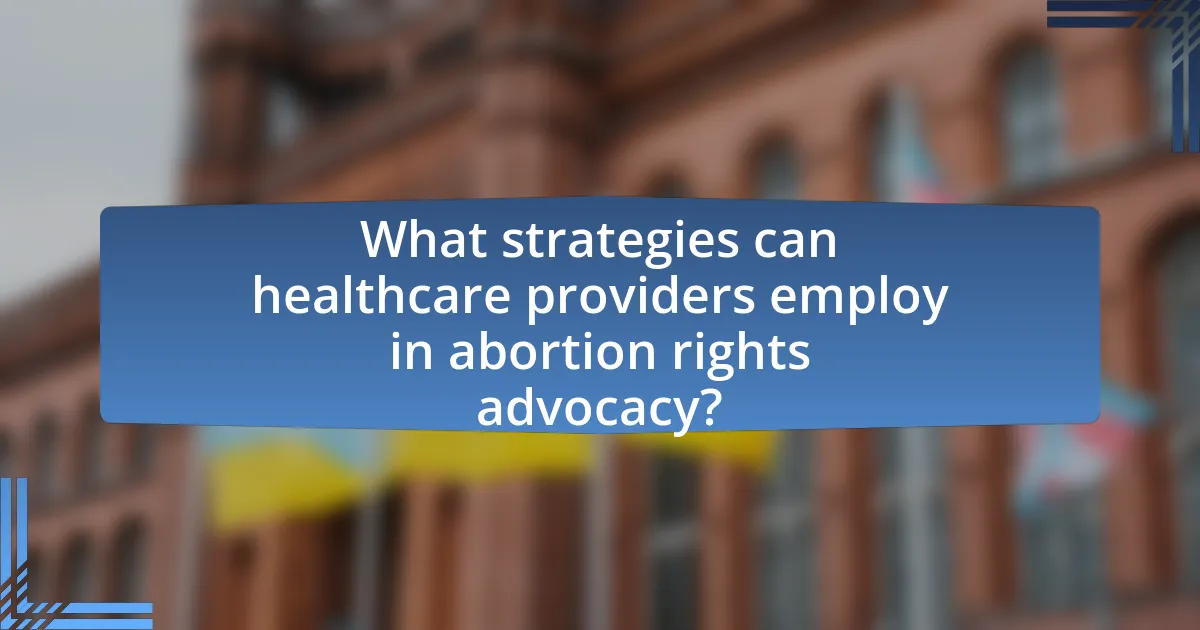
What strategies can healthcare providers employ in abortion rights advocacy?
Healthcare providers can employ several strategies in abortion rights advocacy, including education, policy engagement, and community outreach. By educating patients and the public about reproductive health options, healthcare providers can dispel myths and misinformation surrounding abortion. Engaging in policy advocacy allows providers to influence legislation that protects and expands access to abortion services. Additionally, community outreach initiatives can help build coalitions with local organizations to support reproductive rights, thereby amplifying their impact. These strategies are supported by evidence showing that informed communities are more likely to support reproductive rights, as highlighted in studies from organizations like the Guttmacher Institute, which emphasize the importance of education and advocacy in shaping public opinion and policy.
How can healthcare providers effectively communicate their stance on abortion?
Healthcare providers can effectively communicate their stance on abortion by utilizing clear, evidence-based messaging that aligns with their professional ethics and the needs of their patients. This involves openly discussing the medical, psychological, and social implications of abortion, ensuring that information is accessible and devoid of stigma. Research indicates that when healthcare providers engage in empathetic dialogue and provide factual information, patients are more likely to feel supported and informed in their choices. For instance, a study published in the American Journal of Public Health found that healthcare providers who discuss abortion openly contribute to reducing misinformation and enhancing patient trust.
What messaging techniques resonate with the public regarding abortion rights?
Messaging techniques that resonate with the public regarding abortion rights include personal storytelling, emphasizing women’s autonomy, and using data-driven arguments. Personal storytelling humanizes the issue, allowing individuals to connect emotionally with the experiences of those affected by abortion laws. Emphasizing women’s autonomy highlights the importance of personal choice and control over one’s body, which aligns with broader values of freedom and rights. Data-driven arguments, such as statistics showing the safety of legal abortions and the negative impacts of restrictive laws, provide a factual basis that can persuade undecided individuals. For instance, research from the Guttmacher Institute indicates that access to safe and legal abortion significantly reduces maternal mortality rates, reinforcing the argument for maintaining abortion rights.
How can healthcare providers utilize social media for advocacy?
Healthcare providers can utilize social media for advocacy by sharing accurate information, engaging with the community, and amplifying patient voices. By posting evidence-based content related to abortion rights, healthcare providers can educate the public and counter misinformation. Engaging with followers through Q&A sessions or live discussions fosters a sense of community and trust. Additionally, sharing patient stories (with consent) can humanize the issue and highlight the importance of access to abortion services. Research indicates that social media campaigns can significantly influence public opinion and policy discussions, making it a powerful tool for advocacy in the healthcare sector.
What best practices should healthcare providers follow in their advocacy efforts?
Healthcare providers should prioritize evidence-based communication, collaboration with community organizations, and continuous education in their advocacy efforts. Evidence-based communication ensures that healthcare providers present accurate data and research to support their positions, which is crucial in discussions surrounding abortion rights. Collaboration with community organizations amplifies their reach and effectiveness, as these partnerships can mobilize resources and support from diverse groups. Continuous education keeps healthcare providers informed about the latest developments in reproductive health policies and practices, enabling them to advocate effectively. These practices are supported by studies showing that informed and collaborative advocacy leads to more impactful outcomes in public health initiatives.
How can healthcare providers ensure they are informed about current abortion laws?
Healthcare providers can ensure they are informed about current abortion laws by regularly consulting legal resources, attending professional training sessions, and subscribing to updates from reputable organizations. Legal resources, such as state health department websites and legal databases, provide the most current information on abortion legislation. Professional training sessions, often offered by medical associations, help providers stay updated on changes in laws and best practices. Additionally, organizations like the American College of Obstetricians and Gynecologists frequently publish guidelines and updates regarding reproductive health laws, ensuring that healthcare providers have access to accurate and timely information.
What role does continuous education play in effective advocacy for healthcare providers?
Continuous education is essential for effective advocacy among healthcare providers as it equips them with the latest knowledge and skills necessary to address complex issues in patient care and policy. By staying informed about current research, legal changes, and best practices, healthcare providers can effectively communicate the importance of abortion rights and advocate for patient access to care. For instance, a study published in the Journal of Health Politics, Policy and Law highlights that ongoing training enhances providers’ ability to engage in policy discussions and influence legislative outcomes, thereby reinforcing their role as informed advocates in the healthcare system.
What resources are available for healthcare providers to enhance their advocacy skills?
Healthcare providers can enhance their advocacy skills through various resources, including training programs, professional organizations, and online platforms. Training programs such as the Advocacy Training Institute by the American Medical Association provide structured learning on effective advocacy techniques. Professional organizations like the American College of Obstetricians and Gynecologists offer resources, toolkits, and networking opportunities to support advocacy efforts. Additionally, online platforms such as the National Health Law Program provide webinars and educational materials focused on health policy and advocacy strategies. These resources collectively equip healthcare providers with the necessary skills and knowledge to effectively advocate for abortion rights and related healthcare issues.
